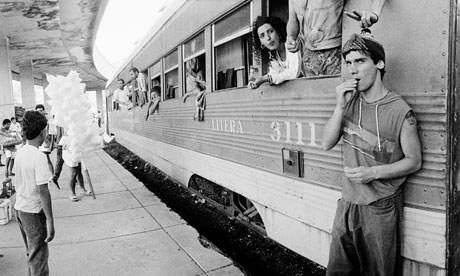
Few musicians would allow a journalist to accompany their band through one of the world's most dangerous countries. Even fewer, one suspects, would be happy about that journalist being their father. But Manu Chao is not just any musician, and his father, Ramón, a critic for le Monde Diplomatique, is not just any journalist - so perhaps it should surprise no one that they ended up together on a legendary 1993 tour of Colombia by train, carrying not just musicians, acrobats and tattooists, but a fire-breathing dragon and an ice museum as well.
Ramón's account of that journey, The Train of Ice and Fire, is published in English next month. For Manu's growing army of admirers, the book provides a magical-realist insight into how his music has developed. More than 15 years ago, Manu and his then band, Mano Negra, took a special train across the country, performing free at stations for people unable to afford the concerts. A 50-strong Colombian-French team constructed the train out of a functioning locomotive and decommissioned carriages and off they went, ignoring all warnings of kidnappings and worse.
Part of the plan was to pay homage to Gabriel García Márquez's One Hundred Years of Solitude, by taking a slab of ice to Aracataca, the town that inspired the novel. Ice is a key theme in the book, from the opening sentence: "Many years later, as he faced the firing squad, Colonel Aureliano Buendía was to remember that distant afternoon when his father took him to discover ice." Clearly, the journey needed someone to write it down.
Chao Jr set a few conditions. "What you write must be accessible to everyone," he told Ramón. "You mustn't use too many literary references. Your last novel was too ornate. I couldn't finish it."
The train travelled through territory contested by Farc guerrillas and the army, attracting the curiosity of both - plus spectators in their thousands, and stowaways. Manu was impressed by the resilience of his audience. In the book, he recounts spending time with Bogotá's street children: "Life's hell for them. But despite everything, they're more cheerful than you or me. They're 12 years old, drugged to the gills and not one of them's a virgin. When they go to sleep at night, they don't know if they're going to wake up - a plastic bag over the head, in the boot of a car, over the mountain and, pow, a bullet in the head."
Ramón was stunned by what they saw of the country during the tour. "It is hard to believe that there is so much violence in such a friendly, affectionate people," he says, on a recent visit to London. To judge by the book, the father, now 73, seems to have indulged in more rock'n'roll behaviour than the son. Although he had never taken drugs and did not even smoke cigarettes, he could not resist some marijuana cake on offer on Christmas Eve. "I was in the clouds and totally out of it for two days. Manu said, 'Honestly, Papa, I can't leave you anywhere.' On another occasion, when I got a tattoo, his reaction was the same. But I think he really liked the fact that I came."
Music runs in the family. Ramón was a child prodigy, a classically trained pianist who left Spain to study at the Conservatoire in Paris. "My father thought I would be the next Mozart but I wanted to be Cervantes," he says. Did he inspire Manu? "When I was 10 or 11, he tried to make me play the piano but I preferred football," says Manu.
The 1993 tour did, in the end, split the band, some of whom departed before the final concerts. Manu returned to Paris disheartened, and went on to form his new band, Radio Bemba. He nearly recruited a new band member in Colombia - a street kid, Rondelle, who could sing and dance brilliantly. Every time Mau and Ramón return to Colombia, they look for him.
The Latin-American connection continues. Manu's new single, La Vida Tombola, features in Maradona, a documentary about the Argentinian footballer. The pair also have an enduring involvement in Radio La Colifata, which translates as Radio Loony, and broadcasts live from a mental hospital in Buenos Aires. Manu will be appearing on the radio station again this year, perhaps recounting again the tale of that train of ice and fire.
• The Train of Ice and Fire is published by Route on 9 February.

